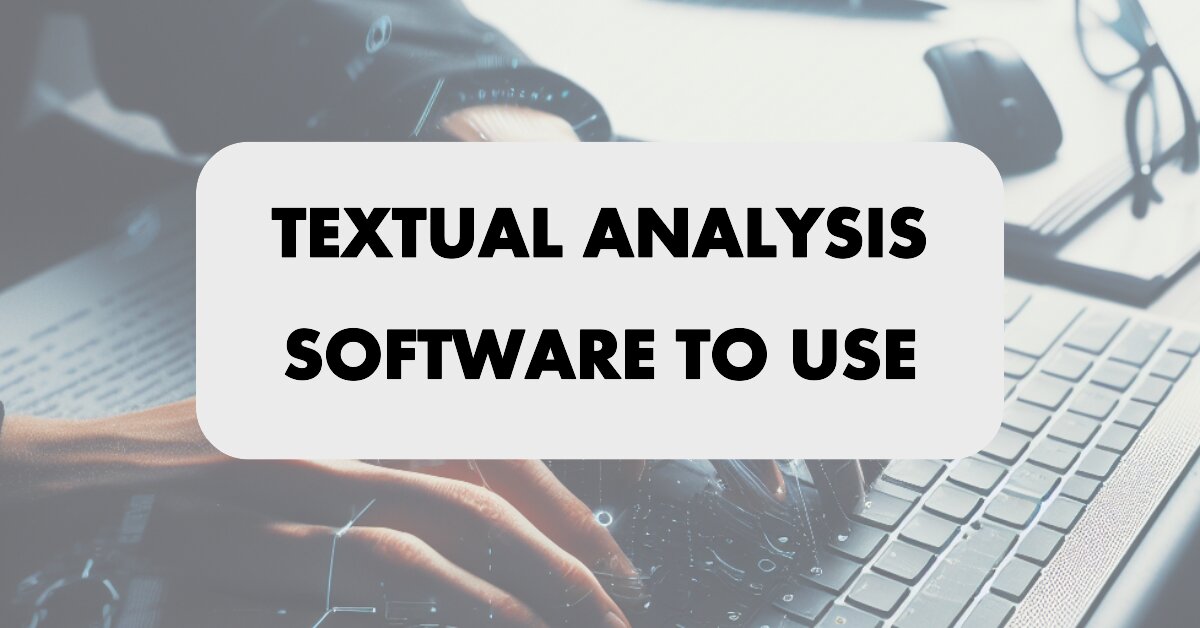Cultivating Insights: Navigating the Landscape of Textual Analysis Software
In an era where the digital realm serves as a treasure trove of information, deciphering the intricate tapestry of textual content has become more crucial than ever. Enter textual analysis software — a digital key that unlocks hidden insights within words. From dissecting literary works to unraveling social media trends, these powerful tools can illuminate meanings, unveil sentiments, and even shape business decisions. As we navigate the vast information landscape, understanding how textual analysis software operates and its diverse applications is akin to wielding a magnifying glass that transforms words into windows of understanding. Let’s embark on a journey through language, data, and discovery, exploring the many facets of these digital analytical companions.
What is Textual Analysis Software
MAXQDA
Sphinx iQ3
Textual
Conte.ai
QDA Miner
Summary
What is Textual Analysis Software
Textual analysis software is your trusted companion, revealing hidden treasures in text. Dive into word selection, like an exclusive backstage pass into authors’ minds, unraveling creative decisions. Explore text organization with coding software, simplifying your journey. Qualitative analysis delves into emotions and thoughts beyond numbers. Dependable tools like textual analysis, text analysis, and content analysis tools are your partners. In essence, textual analysis software anchors your adventure, unveiling meaning and clarity in the world of language. Here are the Top 5 textual analysis software tools!
MAXQDA
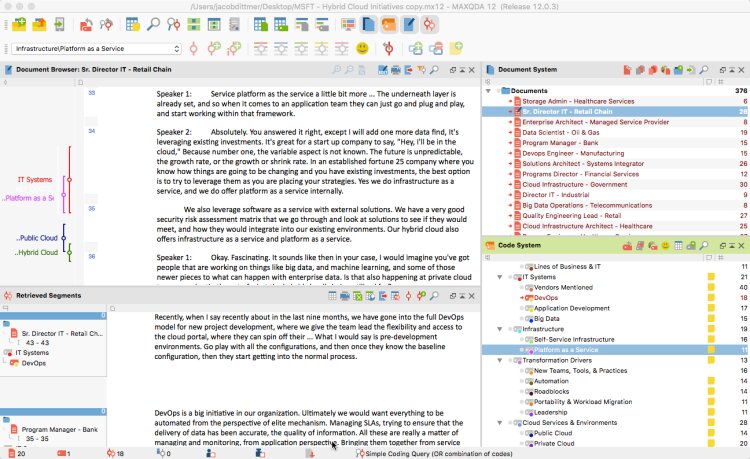
MAXQDA is a comprehensive software package designed for qualitative and mixed-methods research. It provides various tools for analyzing multiple forms of qualitative data, including text documents, audio recordings, video clips, images, surveys, and more. MAXQDA is widely used by researchers, academics, and professionals across different disciplines to gain insights from complex data sets and uncover patterns, themes, and connections.
Key Features
- Document Management: It allows you to import and organize various data types, making managing and keeping track of your sources accessible.
- Coding and Categorization: The software offers advanced coding features, enabling users to assign codes to text or other media segments. These codes represent themes, concepts, sentiments, or different relevant categories.
- Text Analysis: Offers tools for text search, word frequency analysis, and coding comparison, helping users identify patterns and trends within textual data.
- Data Visualization: The software provides visualization tools like word clouds, tables, charts, and diagrams to present your findings in a visually compelling manner.
- Mixed Methods: Supports mixed methods research by allowing researchers to integrate and analyze qualitative and quantitative data in a single project.
- Querying and Retrieval: Users can create complex queries to retrieve specific coded segments of data, facilitating in-depth analysis.
- Team Collaboration: MAXQDA offers features for collaborative research, allowing multiple users to work on the same project simultaneously and facilitating communication among team members.
- Annotation and Memos: You can annotate your data with comments, notes, and memos to capture your thoughts, observations, and insights as you analyze the data.
Use Cases
- Academic Research: Researchers use MAXQDA to analyze interviews, focus group discussions, surveys, and other qualitative data to identify themes and patterns.
- Content Analysis: The software assists in content analysis of documents, articles, and media, helping researchers uncover critical concepts and trends.
- Case Studies: Helps conduct in-depth case studies, allowing researchers to explore individual cases in detail and compare them.
- Literature Reviews: Researchers can use MAXQDA to organize and analyze many academic papers and literature for their literature review.
- Market Research: Marketing and consumer research professionals use MAXQDA to analyze customer feedback, social media posts, and other qualitative data.
- Healthcare Research: Analyze patient interviews, medical records, and other qualitative data.
- Educational Research: Analyze classroom observations, student responses, and other academic data.
Pricing
MAXQDA is a paid software product with different versions available to suit various research needs. MAXQDA Standard Single User License Academia (Annual Subscription) $190,00
Sphinx iQ3
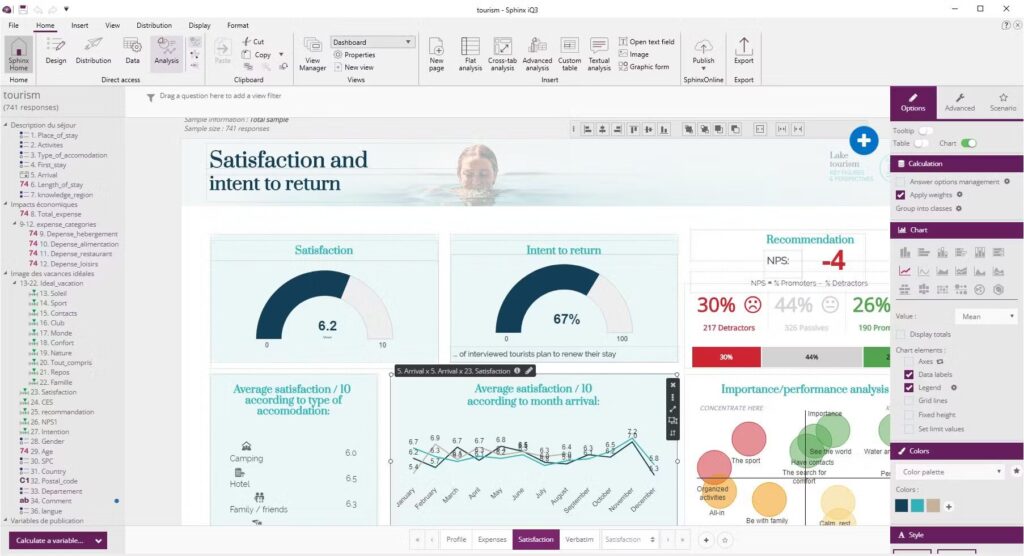
Sphinx iQ3 provides a user-friendly interface that allows users to create surveys, questionnaires, and forms for various purposes, ranging from academic research and market analysis to employee feedback and customer satisfaction assessments. The software covers the entire survey lifecycle, from survey creation to data analysis and reporting.
Key Features
- Survey Creation: Sphinx iQ3 offers a range of question types, including multiple-choice, open-ended, Likert scale, and more. Users can design surveys tailored to their specific needs.
- Data Collection: The platform supports various distribution methods, including web surveys, email invitations, and embedding surveys on websites or social media. This enables researchers to reach a wider audience and collect data efficiently.
- Customization: Users can customize the look and feel of their surveys with branding, logos, colors, and themes to create a consistent visual identity.
- Advanced Logic: Sphinx iQ3 allows for complex survey logic, such as branching, skip patterns, and conditional questions, which enables a more personalized and relevant respondent experience.
- Real-time Reporting: The software provides real-time reporting and data visualization, allowing users to monitor survey responses as they come in and analyze results immediately.
- Data Analysis: Sphinx iQ3 includes tools for data analysis, reporting, and exporting data for further research in other software packages.
- Panel Management: The software supports panel management for maintaining a pool of pre-screened respondents for future surveys.
- Mobile Compatibility: Surveys created using Sphinx iQ3 are designed to be mobile-responsive, ensuring a seamless experience for respondents across different devices.
Use Cases
- Academic Research: Researchers can use Sphinx iQ3 to conduct online surveys for academic studies and gather data from participants.
- Market Research: Businesses and marketing professionals can use the platform to gather consumer insights, conduct market segmentation, and measure customer satisfaction.
- Employee Feedback: Organizations can use Sphinx iQ3 to gather employee feedback about workplace experiences, engagement, and training needs.
- Customer Feedback: Companies can create customer satisfaction surveys to gather feedback on products, services, and overall experiences.
- Education: Educators can use Sphinx iQ3 to create course evaluations, student assessments, and research studies in educational settings.
Pricing
Sphinx iQ3 offers a variety of pricing plans, including options for single researchers, teams, and enterprises. Pricing can vary based on the number of surveys, respondents, and features required.
Textual

Textual is a cloud-based platform that enables businesses to create and manage text message shopping campaigns. It focuses on utilizing text messages to drive instant purchases and engage customers in conversational commerce, which involves conducting transactions and interactions through messaging apps and platforms.
Key Features
- Shoppable Text Messages: Textual allows businesses to send text messages to customers that contain shoppable links, allowing recipients to view products and make purchases directly through the text message.
- Purchase Reminders: The platform can send automated purchase reminders to customers interested in specific products or who have added items to their carts.
- Conversational Commerce: Textual likely provides a platform for businesses to engage in real-time conversations with customers through text messages, enabling personalized recommendations, answering inquiries, and guiding customers through the purchasing process.
- Custom Campaign Creation: Businesses can design and create customized text message shopping campaigns tailored to their products, promotions, and target audience.
Use Cases
- Retail and E-commerce: Businesses in the retail and e-commerce sectors can use Textual to send product recommendations, exclusive offers, and purchase reminders to customers through text messages.
- Hospitality: Hotels, restaurants, and other hospitality businesses can use Textual to send special offers, reservation confirmations, and event invitations to customers via text messages.
- Cosmetic Industry: Cosmetic companies can utilize Textual to send beauty tips, product launches, and promotional messages to customers, potentially leading to direct purchases.
- Direct Sales: Any industry that involves direct sales or quick purchase decisions can benefit from using Textual to provide a convenient and efficient way for customers to make purchases via text messages.
Pricing
Starting price: $99/month
Conte.ai
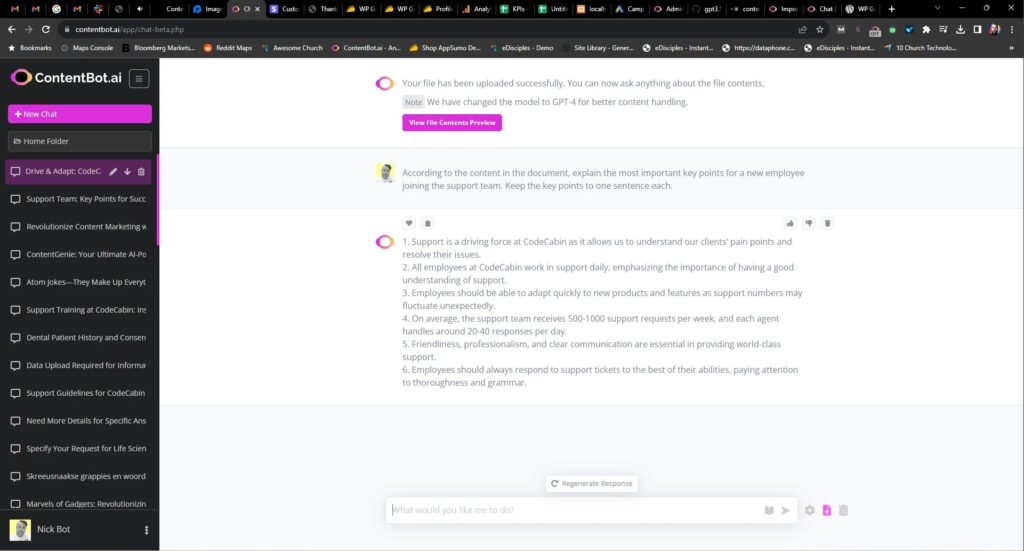
Conte.ai is a platform that encompasses the entire social media management cycle. It aims to provide effective content production for social media and offers features related to competitive analysis, contextual network planning, content placement, and the analysis of outcomes or results. This suggests that the platform is designed to assist businesses in various aspects of their social media strategies.
Key Features
- Content Production: Conte.ai likely provides tools and features for creating engaging and compelling content for various social media platforms, helping businesses maintain a consistent online presence.
- Competitive Analysis: The platform may include capabilities to analyze the activities and strategies of competitors in the social media landscape. This can help businesses gain insights into industry trends and refine their strategies accordingly.
- Contextual Network Planning: Conte.ai might offer features for planning and scheduling content posts across different social media platforms that align with each forum’s specific context and audience.
- Content Placement: The platform could help businesses identify the optimal times and media for posting their content, increasing the likelihood of reaching the right audience.
- Outcome Analysis: Conte.ai likely includes tools for tracking and analyzing the outcomes of social media efforts. This can involve measuring engagement metrics, reach, conversions, and other key performance indicators (KPIs).
Use Cases
- Businesses of All Sizes: Conte.ai appears to cater to companies of various sizes, ranging from small startups to larger enterprises.
- Industries: The platform seems suitable for businesses across industries, suggesting its versatility and adaptability to different market sectors.
Pricing
- Free trial – 7 days
- Start – $6.9/month or $69/year
- Business – $9.9/month or $99/year
QDA Miner
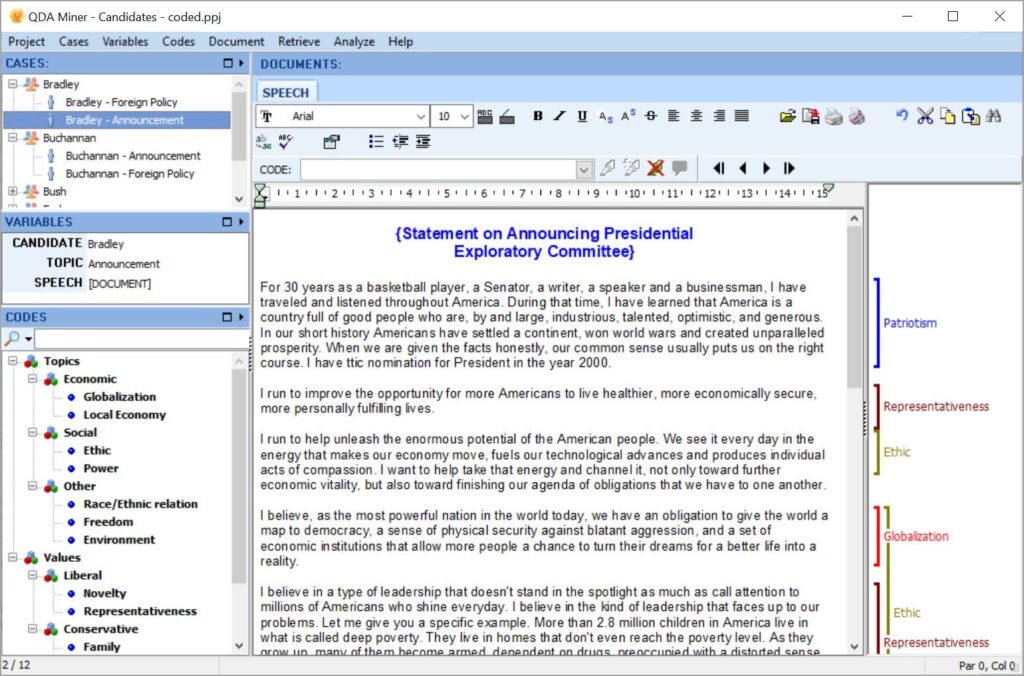
QDA Miner is a user-friendly software that supports qualitative data analysis by helping users manage and analyze complex textual and multimedia data. It’s often used in social sciences, psychology, market research, anthropology, etc. The software is designed to streamline the process of data coding, exploration, and interpretation, enabling researchers to uncover meaningful insights from their data.
Key Features
- Text Analysis: QDA Miner provides tools to import, organize, and analyze textual data from various sources, including documents, transcripts, and notes.
- Coding and Categorization: Researchers can create a coding system to categorize segments of text data. This allows for systematically identifying and organizing themes, concepts, or patterns within the data.
- Code and Text Retrieval: The software enables users to retrieve coded segments of text based on specific codes or criteria, facilitating analysis and comparison.
- Data Visualization: QDA Miner offers visualizations such as word clouds, frequency tables, and charts to help users understand patterns and trends in their data.
- Multimedia Analysis: In addition to text, QDA Miner supports multimedia data, including audio, video, and images. This is particularly useful for researchers working with diverse data types.
- Text Mining: The software includes text mining features that help identify keywords, phrases, and trends within large datasets, aiding in data exploration.
- Annotation and Memoing: Researchers can annotate and add notes (memos) to data segments, helping to capture insights and interpretations during the analysis process.
Use Cases
- Academic Research: QDA Miner is commonly used for qualitative studies such as content analysis, case studies, and thematic analysis.
- Market Research: Researchers can use the software to analyze customer feedback, reviews, and social media data to gain insights into consumer opinions and trends.
- Social Sciences: QDA Miner supports research in sociology, psychology, anthropology, and other social science disciplines by facilitating the analysis of interviews, focus groups, and surveys.
- Healthcare: Researchers can use QDA Miner to analyze patient narratives, medical records, and qualitative data in healthcare studies.
- Business Analysis: Market analysts can use the software to analyze market trends, competitor strategies, and customer feedback to inform business decisions.
- Education: QDA Miner can aid educational researchers in analyzing qualitative data from classroom observations, student surveys, and academic texts.
Pricing
QDA Miner offers a custom price, so, you’ll have to contact the sales team for pricing.
Summary
Amid our journey, we encounter a toolkit of textual analysis tools, each equipped to decipher content, analyze codes, and extract insights. From content analysis to visual text analytics, these tools act as companions, empowering us to decode the complexities of language and see beyond the obvious.
In conclusion, textual analysis software is more than just a tool — it partners in our exploration of language’s hidden dimensions. It empowers us to dive into the intricacies of word choices, navigate the organized coding pathways, and engage in heartfelt conversations with text. With these tools by our side, we unveil the magic within words and embark on an exhilarating journey through the world of textual analysis.
